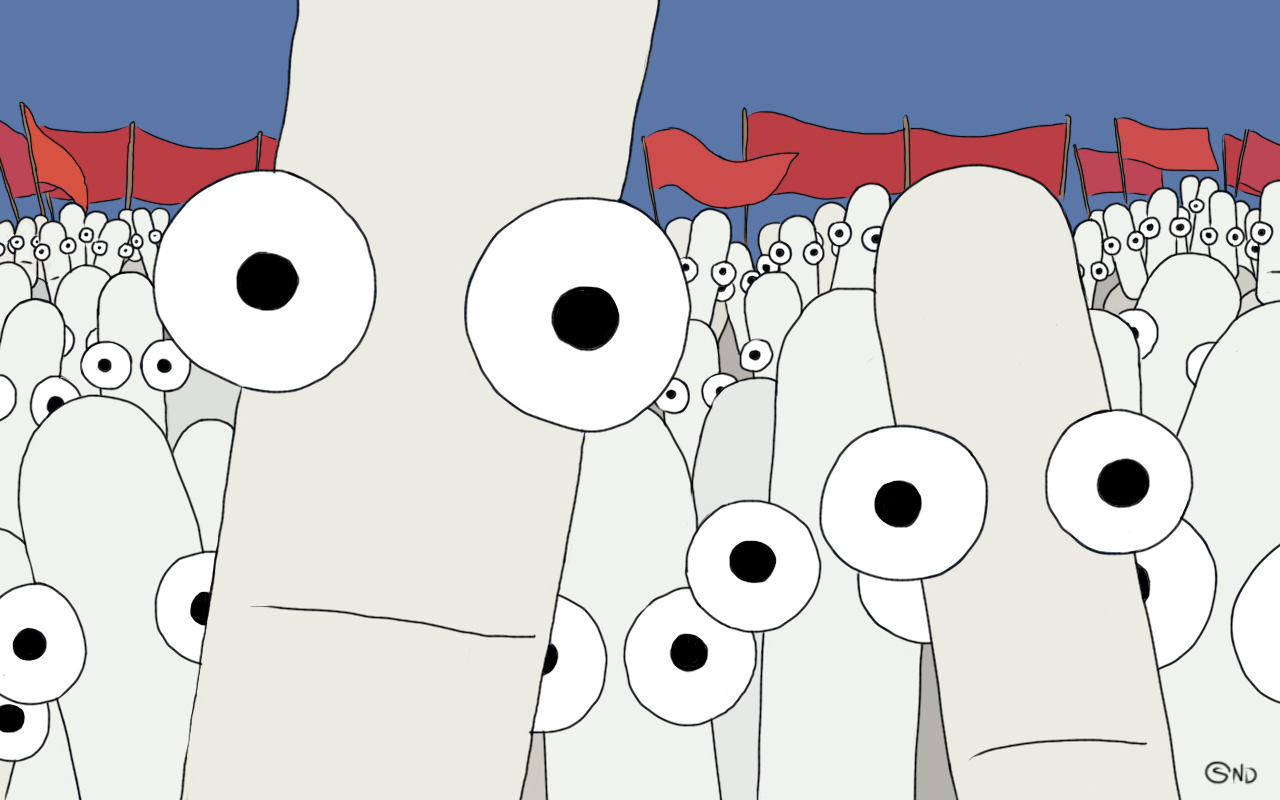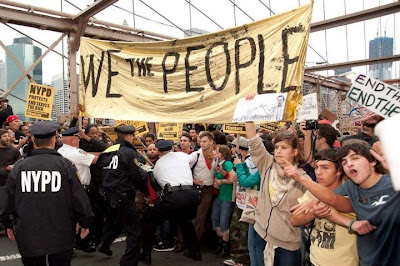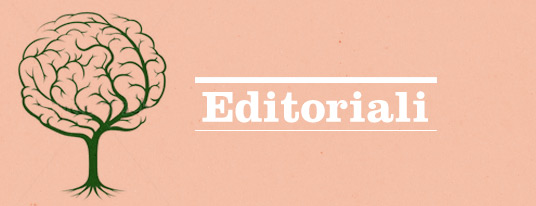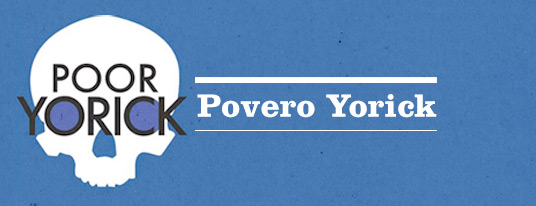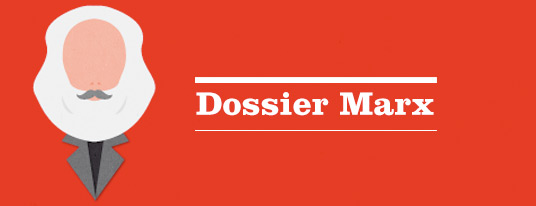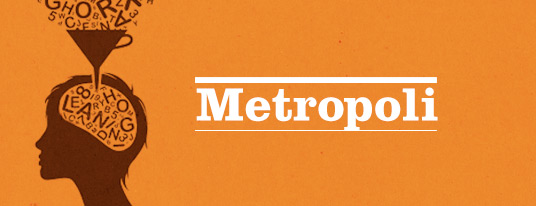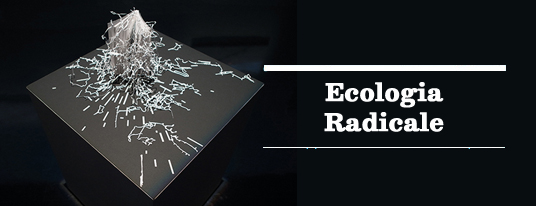by TONI NEGRI
1. At the end of World War II, Pollock’s intuition – elaborated at the time of the Weimar Republic is confirmed: the capitalist market cannot be considered simply and rhetorically as the freedom (or even anarchy) of circulation and realization of the value of commodities, but, on the contrary and fundamentally as the unity of domination at the social level, as ‘planning’. This socialist concept, abhorred by capitalist economic thinking, gloriously re-enters the categories of economic science. The concept of ‘social capital’ (that is a capital unified in its social extension, within and above the market, and as dispositif that guarantees the functioning of such a market) as a cypher of an effective capitalist direction of society is ever more extensively developed. Particularly important from this point of view are the debates within the Western Communist Left about the Soviet Union. In the 1940s, the Trotskyist workerist dissidents developed a concept of ‘state capitalism’ in order to define the Soviet regime. They considered the Thermidor of the Russian Revolution not as a contingent passage in the transition to communism, but as a specific and progressive function of the re-organization of mature capitalism. In the Italian debate of the 1950s, confronted with the capitalist modernization of the period of reconstruction, the concept of ‘social capital’ is developed in particular by Raniero Panzieri – the Italian translator of the second volume of Marx’s Capital and founder of Quaderni Rossi. On the basis of the analysis of the processes of circulation of capital, Panzieri develops the concept of ‘social capital’, de-mystifying the idea of the ‘free market’, and also recuperating, in addition to the above mentioned Trotskyist dissident current, elements of European liberal thought – which, with Keynes, had placed social capital and monetary policy at the centre of the democratic planning of Fordist development. But we can refer especially to the Frankfurt School (following Pollock) which assumes the concept of capitalist development as totality and progressively develops the theory of the ‘subsumption of society under capital’ –from a structural point of view (the whole society comprehended in capitalist domination), from a spatial point of view (by the imperialism of the world-system), and, with finer insight, as a continuous process of reciprocal translation of technologies and anthropological transformation. It is in this complex terrain, faced with this social ontology and these dynamics, that the theme of emancipation and its practices are proposed.
On the other side, and outside this strong materialist methodology, in Western Marxism between the two wars and immediately after, and in the epigones of Frankfurt (forgetful of that other rich anthropology which had been anticipated), the space of emancipation is rather built on (or rather reduced to) a moral (ethical) horizon and that of liberation is defined as undoubtedly utopian. An idealist perspective imposes itself. The consequences of the theory of ‘social capital’ are assumed within a dialectics which does not re-live the experience of exploitation. If little by little capital seems to constitute the inhuman, it is said, and the Aufklärung is translated into its opposite, within this impoverished reading a tradition emerges which considers emancipation or liberation as an ‘outside’. We are in the kingdom of metaphysics, where communism is presented as a product of a thought that in an absolute way realizes the universal, or as the inoperative reflex of a being subtracted from history. Today Badiou and Agamben have recovered those old frustrations, thus subtracting desire from life, without realizing that those illusions consign the struggles for emancipation to powerlessness and defeat, to a fate of obedience and pain.
Let’s recover, instead, workerist thought. In Marx, the concept of capital is always given as a ‘social relation’ – against any idealistic position that would consolidate its figure in a unity. Capital, capitalism, the dimensions of social command, cannot be given as an accomplished totality: the capitalist subsumption of the social is the subsumption of a contradiction, of an antagonistic relation that persists. But there is more: every epistemology of capitalist development cannot but be given starting from an antagonistic position within the same development. Analysis is always ‘within’ and to be within it will also be ‘against’. If social domination always implies an other on which it is exercised, this relationship is ‘intransitive’, it avoids any solution of the dialectics, any overcoming of the antagonistic movement, it imposes a movement of resistance which is not only ethical, but also epistemic. Some consequences follow from this, which we will state here, but on which we will return. The first one is located at a ‘macro’ level, which allows us to interpret the development (and crises) of capitalism as an antagonistic process whose dynamic is marked by continuous, albeit different, conflictual intensities. There are always winners and losers in this indefinite and open process. The second consequence, at a ‘micro level’, is revealed as the continuous modification of the social composition of subjects, both from the technical and political point of view – the different densities of capitalist relationships push its contradictions towards figures that are ever more singularized and irreducible. The third consequence refers to the fact that, out of the relation between intensity and density proper to capitalism flow new qualities of subjects who participate to such developments. When, as happens in post-Fordist societies, the social relation that constitutes capital occupies the whole of society and determines its productivity, when productivity becomes cognitive, immaterial, affective, cooperative etc, that is ‘production of subjectivity’, then exchange becomes ontological and we witness a deepening of antagonism that invests the subjects – particularly those figures of living labor who recognize themselves as ever more capable of appropriating portions of fixed capital and autonomously developing, on a cooperative basis, such productive efficacy.
2. Before getting any further into the debate, I would like to be allowed here to insist on the importance of Foucault’s thought in allowing research to proceed in this sense. Such thought has been fundamental in redefining capitalist development as the development of an ‘intransitive’ relation between biopowers and subjective resistances and in introducing the analysis of the anthropological transformations that follow from the intransitivity of this relation. Resistance (folding on itself, producing autonomous subjectivities) is furthermore configured as the production of singularity and the ontological instances of singularization, so clearly defined by Deleuze, became concrete in the Foucauldian theory of the ‘dispositif’. The dispositif is the productive tension which is impressed on the subject – the tendency to the development of the production of subjectivity within cooperative processes and their collective metamorphosis. The Foucauldian dispositif is a machinic conatus and a productive cupiditas which pushes forward the autonomy of the subjects in their resistance to capital – within and outside, then, the capitalist relation. When one talks of Foucault’s Marxism, we talk about this machine of immanence which finds, not so much in the industrial structures of the class struggle but in the social consistency of capitalist domination, the power of resistance, of the break, of the alternative. It is a new world that becomes real -biopolitical creativity against biopower..
3. Let’s consider the conclusions drawn at point one and let’s try to scrutinize the theme of the ‘limits of capitalism’.
In the third volume of Capital, Marx claims that capital is the very limit of capitalism. He arrives at this statement whilst demonstrating the tendential fall of the rate of profit in the development of the organic composition of capital. If capitalist valorization (and hence profit) is given out of the employment of ‘living labor’ (and out of the exploitation/extortion of its creativity), the more the mechanization of work gains power (and hence valorization is displaced and flattened onto the constant elements of capital), the least the value of capital will increase since the employment (exploitation) of labor power decreases.
In the nineteenth and early twentieth century this law has been interpreted as catastrophic for the development of capital. It has not worked out in this way: the limit did not appear in relation and on the measure of the expansion of the technological accumulation of the capitalist system and the transformations of the subjectivities put to work has expanded rather than restrained the field of accumulation, exploitation and domination. This does not mean that the limit has disappeared –it persists and capitalists always dramatically feel its imminence – but this limit has been displaced and re-localized when faced with the new subjectivations thus produced. As a result, as we have already remembered while re-thinking the contribution of the Frankfurt school, the antagonistic character of capitalist development can not be acknowledged or revealed on the objective terrain: it can only be interpreted when one looks at these new subjectivities that development has produced – or, if you want, at the materiality of the new anthropological figures, singular and subjectively relevant – that is, at the anthropological transformations introduced by the such capitalist development, at the mutations of labor power, and at the new dialectic between immaterial labor power and re-appropriation of fixed capital.
I would like to say that the capitalist catastrophe linked to the fall of the rate of profit was not realized and that is not due to the power of capitalism to avoid it through successive waves of technological innovation, of territorial expansion, which update and transform the tools of domination (as expressed lately in the relevance of financial domination in relation to industrial politics). Rather, the catastrophe has been reconfigured and delayed by means of the transfer of the capacity to produce and accumulate from the bosses to the workers; from the power of constant-capital to the diffusion of processes of proletarian re-appropriation of fixed capital. The limit of capitalism is thus revealed as the extension of its domination, from the fact that it has subsumed the planet, but in this way it has been forced to create ever more singularized producers, ever stronger in their autonomous cooperation, in their capacity to exist and produce outside the homologizing obsession of (capitalist) command, and to build, chaotically but alternatively, their ontological independence.
4. Why this return today to the problem of the ‘limits of capitalism’? At first sight, it seems as if the problem is posed simply in the field of politics, that is that it is born out of the crisis of the relation between capitalist development and democracy, that is the crisis of the democratic (representative and parliamentary) State and the rule of law. Are capitalism and democracy really incompatible from a constitutional point of view? They are and they are not: what is certain is that, given the current conditions, capital is incompatible with an egalitarian and progressive democracy. The crisis of social-democracy is probably to be read in this way.
However, these considerations are insufficient to define the difficulties found today in the relationship between capitalism and democracy. Doubtlessly, constitutional democracy is experiencing difficulties when confronted by instances of equality growing out of ever more cooperative productive worlds and the economic order of private property encounters difficulties when confronted with those instances of the ‘common’ that increasingly arise in the current productive conditions. It is a cognitive labor power which is not consumed by use and that is implemented in cooperation, which is not usable if not in its dynamic and cooperative composition, in its exceeding – hence- with relation to any measure and any autonomy from extrinsic command. This is the ‘common’ character of actual productive power – linguistic, affective, immaterial, cognitive, and cooperative. The economic order of possessive individualism and private property no longer has any ontological consistency. On this point, modern constitutionalism and the world of life clash in an irreducible manner. We conclude then that this relationship is in crisis, for at least two reasons, going much beyond the crisis of the rule of law: the first is that money has overtaken work; the second that technics has overtaken life.
5. At the end of this intervention, we’ll see how these two contradictions find their cause in the tendency of the capital relationship to break: the ‘One’ of power, money, capital broke in ‘two’ and cannot be re-compacted. But before reconsidering this basic element, let’s open the discussion on the problematic surface approximated up to this point.
When we analyze the structure of financial capital, it becomes clear how money has overtaken work: it has produced ways to control a living power which, beyond extending itself socially, put the capital relation beyond any material measure. Profit abysmally detaches itself from labour, the law of labour value is completely dissolved. Globalization happens within this tendency, stretching it in the global space and making it ever more uncontrollable.
The property of money – the financial convention – poses itself as the regulative norm of social and productive activities and, hence, as access to a ‘proprietary reality’ whose efficacy is based by now only on the most arbitrary monetary function. Property becomes deeds, money or shares, mobile property or real estate, that is that it has a conventional and juridical nature. André Orléan and Christian Marazzi – two authors whom I believe to be fundamental references in the present conjuncture – have rightly insisted on this transformation. We need to think about the financial convention as a command independent from any ontological determination: this convention fixes and consolidates a ‘proprietary sign’ (in terms of ‘private property’) and remains even when it is present as an exceeding not simply in relation to old and static determinations of labor-value but even in relation to that continuous ‘anticipation’ and ‘increment’ which are proper to it in exercising the financial capture of socially produced value and in operating at a global level. It should be clear, then, that in this new configuration of the proprietary rule the material basis of the law of value remains. And yet, in reading the law of value, it is not about individual labor that becomes abstract, but immediately social labor, common, and as such directly exploited by capital. The financial rule can thus pose itself hegemonically since in the new mode of production, the common emerged as the preeminent basis, as the substance of relations of production, and keeps invading all social spaces as the norm of valorization. Financial capital follows this extension of the common, it wants to translate it directly into profit, pushes mobile and real estate rent, and anticipates it as financial rent. Another economist, Harribey, in a debate with Orléan, puts it well; value is no longer given in substantial terms, it does not show itself even as a simple accounting phantasmagoria: it is rather the sign of a productive common, mystified but effective, that develops ever more intensively and extensively. Money has thus overtaken labor and by now looks at labour as at a distant shore which will not be necessary to approach – in the illusion that this abstraction can last, that the corruption of values and monetary speculation can keep advancing.
Secondly, technics has overtaken life. This means insisting on two elements: the first concerns the dissolution of the functional homogeneity that industrial activity determined between technological development and the development of labor-power. On the contrary, today, within the (no longer industrial) productive structure, the subjectivation of labor power is given in a manner that is ever less soluble by the productive command. We do not witness, in fact, solely the theft of surplus value by constant capital, but at the same time witness the appropriation of fixed-capital by labor power. Technological command can no longer keep still the relationship with the autonomous cooperative socialization of labor. We are confronted here with a paradox. It concerns production and consists in the fact that financial capitalism represents the most abstract and detached form of domination at the same moment where it concretely invests the entire life. The ‘reification’ of life and the ‘alienation’ of subjects are produced by a productive command which – in the new mode of producing, organized by financial capital – has become completely trascendental over cognitive labour-power. However the latter, when it is forced to produce surplus value, because it is cognitive, immaterial, creative, not immediately consumable, reveals itself as autonomously productive.
The paradox becomes fully visible when one considers the production essentially based on ‘social cooperation’ (information-based, care work, services etc). The valorization of capital does not simply clash with the massification of ‘variable capital’ but with resistance and autonomy of a multitude which has re-appropriated a ‘part’ of ‘fixed capital (presenting itself, if you want, as ‘machinic subject’) and a continuously ‘relative’ capacity to organize work-related social networks.
This paradox and this contradiction violently oppose ‘constant capital’ (in its financial form) and ‘variable capital’ (in the hybrid form which it assumes having incorporated ‘fixed capital’) and thus it tends to implement the verticalization of command and the break with the representative structures of the ‘rule of law’.
We verify the existence of a second contradiction when we realize that because of these processes of re-appropriation -by workers- of fractions of fixed-capital, capitalist domination on the one hand stretches and orders the life of workers, of society to their full extent – and hence can be defined as ‘biocapital’ – on the other hand it encounters ever more insurmountable difficulties in confronting the workers’ bodies.
Here conflict, contradiction, antagonism are fixed when capital (in the postindustrial phase, in the epoch when cognitive capitalism becomes hegemonic) must put human bodies to work by turning them into singular machines, no longer simply subsuming them as labor-commodity. So (in the new processes of production) bodies ever more efficiently specialize and conquer autonomy since, by means of resistance and the struggles of machinic labor power, this ever more expressly develops the demand for a ‘production of the human by the human’, that is for the ‘human’ living machine.
So in the moment where the worker re-appropriates a part of ‘fixed capital’ and present themself in a variable manner, often chaotic, as a cooperative actor in processes of valorizarion, as a subject that is ‘precarious’ but also autonomous from the valorization of capital, it poses a complete inversion of the function of labor with relation to capital: the worker is no longer the instrument used by capital to conquer nature – which banally means to produce commodities; but the worker, having incorporated the tool, having metamorphosed from an anthropological point of view, reconquers ‘use value’, acts machinically, in an alterity and autonomy from capital, which wants to become complete. Between this objective tendency and the practical dispositifs of the constitution of this machinic worker, we find the ‘class struggle’ that we can by now call ‘biopolitics’.
6. These paradoxes remain unresolved in the action of capital. As a consequence, the stronger the resistance, the harder the attempt at restoration by the State. Every resistance is thus condemned as an illegal exercise of counterpower, every manifestation of revolt is defined as ‘pillaging and looting’. Another paradox – but this time it is pure mystification – in exercising a maximum of violence, capital and its State feel the need to show themselves as a neutral and inevitable figure: the maximum of violence is exercised by ‘technical’ instruments and/or organs. ‘There is no alternative’ said Margaret Thatcher. You understand hence that here, in the name of this inevitable domination (that is rational to capitalist logic), technologyovertakes life in extreme forms, but nevertheless not less typical and generalized. The case of the ‘nuclear state’ is characteristic; in this model, technology becomes the forced guarantor of sovereignty as a permanent blackmail of all public power against any force or movement (especially in domestic politics) which wants to or can impose itself on the ‘legitimate sovereign’. These are probably phenomena which turn the relation of capital to extremes and determine the crisis of democracy as a simple form of social-democratic control of development.
“A nuclear state” is, in fact, that which wants to impose the sovereign ‘exception’ in physical terms and shape the autonomy of the ‘state politics’ within an insurmountable technological figure, guaranteeing capitalist domination and the impossibility of going beyond it. Here modern sovereignty definitely becomes ‘biopower’. Is it not the case that what is renewed by means of the ‘terrible power’ of the Nuclear State’, through the technological function, is that tradition of sovereign power that in history has characterized so much the tradition of absolutism?
In this last case, the nuclear State, the limit of capitalism is given – it is the very catastrophe of life. But it is an extreme case – not ontologically necessary even if logically possible. This catastrophic dimension gladdens reactionary spirits: Heidegger could, by this trace, extend atomic thinking to the whole of life, generalize the effects of nuclear technology as the very concept of technics. We propose that the power of life and the joy of liberty can avoid these transcendental threats. We oppose ontological resistances, we tear technology away from the hands of capital, incorporate it not as the garment of the slave, but as a corporeal instrument of emancipation.
7. What is then, the limit of capital? It is always in that subjective place where the exploitation of labor is broken and the slavery of private property and monetary lordship is taken away– in the place where we re-appropriate not only technologies, but control over them. And since technologies are protheses of the human, the problem is to make technology a prothesis of our resistance, of our revolt and humanity. It is in the construction of the ‘common’ that we re-appropriate technologies and become powerful – the historical process of capitalist development (at the same moment where it has elevated itself in the form of financial capitalist power to the rank of an exaggerated and empty transcendence) allows an anthropological transformation that goes in the direction of a cooperative singularization. It is not a process of individualization of possessive subjects but a proliferation of cooperative singularities. Technological intensities, cooperative densities, singular qualities are the product of and produce new anthropological figures. The common is not an organic compactedness, but a cooperative set of singularities. Here we recognize the subjective place where the limit of capitalism is posed, because here is given the intransitivity of that relation that defined capital as such.
However, looking at the process that we have described up to here, from the point of view of those philosophers that we have stigmatized because they have expressed an idealistic and moralistic critique of the relationship of capital, one could object: but what singularity can ever be given, what limit can be given if it is produced in such an impure manner, if, in particular, it is contaminated by the re-appropriation of fixed capital? We need to say this clearly, responding to these objections; there is no liberation, there is no subjectivity that is not completely charged by and immersed in the violence of the relations of capital. There is no place where humanity could naively or desperately recompose or emancipate itself. In the ‘universal man’ which interpreted the idea of the common? But where are we going to find him after the catastrophe of ‘real socialism’? Or in ‘bare life’? But bare life is only the culmination of abjection, that power has produced, which has deprived it of any ontological dignity. S/he who rebels and resists, the ethical human, is always dirty like the cynical philosopher (as Foucault reminds us) and takes charge of the whole of historicity. What is it then, this processes of appropriation which arms subjectivity? It consists in making one’s own, in grasping, in turning mental and corporeal prostheses into something affective and linguistic, , that is in re-conjoining to one’s own singularity some capacities that before were acknowledged only in the machines with which one worked, in incorporating these machinic characteristics, and thus turning them into attitudes and primary behaviours of the activity of working subjects. In the detachment established between two subjects of the capitalist relation (the boss and the worker) is given, on the side of singularities, a reappropriation of fixed capital, an irreversible acquisition of machinic elements subtracted from the valorizing capacity of capital.
Now every reappropriation is a destitution of capitalist domination. This process of appropriation, especially that waged by immaterial workers – today the majority in processes of valorization – is in fact very strong, efficient in its development – it determines a crisis. But it would not be a crisis if we considered that it is born spontaneously from processes of reappropriation and destitution. This is not the case. The crisis needs a clash, a political reality that moves not simply to destroy the relation of exploitation, but also of the forced condition that sustains it. Effectively, when one speaks about re-appropriation by the antagonistic subject, one does not simply speak of the modification of the quality of labor-power (which derives from the absorption of portions of fixed capital), but one speaks essentially of that reappropriation of that cooperation that in capitalist restructuring was sustained and then expropriated – and that represents the essential drama of this critical phase. When we talk about the re-appropriation of fixed capital – far from expressing itself in terms stained by economicism – the analysis enters that terrain of cooperation that today is regulated in biopolitical terms by capital: to destitute capital of this function means to reclaim for labor power the autonomous capacity of cooperation.



